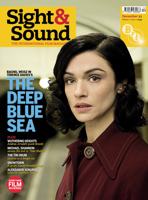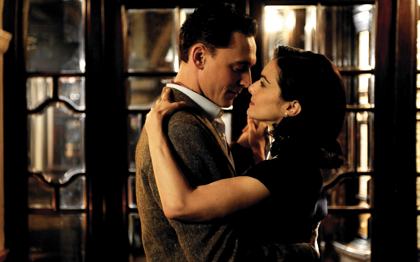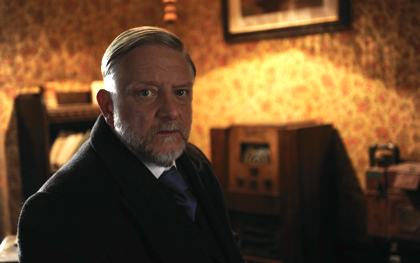Primary navigation


A love-triangle drama set in a tattered post-war England, Terence Davies’ adaptation of Terence Rattigan’s play may still not be Sophocles, but does play like a cinematic opera, says Jonathan Romney
In his centenary year, dramatist Terence Rattigan, long considered the outmoded epitome of bourgeois English theatre, has again become fashionable, with a spate of West End revivals. His new modishness certainly won’t be part of his appeal to Terence Davies, whose cultural tastes make his as determinedly old-fashioned (or at least anti-fashion) a sensibility as Woody Allen’s.
Davies’s The Deep Blue Sea can certainly be considered ‘old-fashioned’, both in its fascination with traditional English mores and in the seriousness, unmodulated by mitigating irony, with which it treats intense emotion. In the film, Hester Collyer – a judge’s wife who has an unhappy affair with an RAF pilot – dismisses her plight as not really tragic: “Sad perhaps, but hardly Sophocles.” Yet Davies gives Hester’s story an unembarrassed emotional resonance in the lineage of the great ‘women’s pictures’ of the 1940s and 1950s.
Davies has adapted the play – previously filmed in 1955 by Anatole Litvak – partly by stripping down Rattigan’s cluttered text. He clears out the verbose interventions of gauche neighbours the Welches, and pares down the role of the sympathetic Miller, a doctor struck off (it’s implied) for homosexuality, and therefore well able to understand Hester’s wilfully adopted outcast status.
At the same time, Davies has not exactly opened out the play – set over one day in Hester’s flat – but amplified it with his own additions. The tolerant landlady Mrs Elton, formidably played here by Ann Mitchell, now has a key scene in which she offers Hester a home truth, in terms Rattigan might have shuddered at. Seen tending her invalid husband, she says to Hester, “You know what real love is? It’s wiping someone’s arse… and letting them keep their dignity, so you can both go on.”

Davies also creates an episode in which the stresses of Hester’s marriage become clear during a visit to her mother-in-law – a brittle tour de force by Barbara Jefford. This sequence leads Davies to somewhat overstate Hester’s defiance – it’s hard to credit her talking back to this fearsome matriarch quite so crisply – but there’s some relishable wit in the older Mrs Collyer’s espousal of “guarded enthusiasm” over passion, and her cooing over the cake (in a line worthy of Joe Orton): “The Battenberg – it’s a pleasure I’ve never outgrown.”
There are other additions: the exuberantly boyish RAF banter of Hester’s lover Freddie (“I served in the Battle of Britain, old fruit, old darling”) is arguably laid on a bit thick, though it helps establish her amused delight in him. And there are several musical moments that echo Davies’s earliest features: a single-shot track along the platform of Aldwych tube during the Blitz, to a sung ‘Molly Malone’; one pub singalong, done straight, and another to ‘You Belong to Me’ which fades into the Jo Stafford recording as Hester and Freddie dance, perfectly capturing the fantasy-tinged intimacy of their romance.
In his patented singalong moments, Terence D, it might be objected, overwhelms Terence R. But then the film, unlike the play, is not remotely naturalistic. Rather than a conventional adaptation, this is more like a cinematic opera after Rattigan. The film’s masterstroke is a seamless eight-minute ‘prelude’, set to Samuel Barber, in which the surging orchestrations accompany a scene- and mood-setting crane shot from a bombed-out building to the window where Hester stands, prior to her suicide attempt (the shot is repeated in reverse, by daylight, as the film ends on an equivocally positive note). Barber’s concerto continues through a sparsely worded series of flashbacks – notably a bedroom sequence showing just how unequivocally carnal Hester and Freddie’s relationship is.

The three leads are superb: the anachronistic looks of Tom Hiddleston’s Freddie fit the period perfectly; Simon Russell Beale has a sympathetic, wounded gravitas as Hester’s husband William; and Rachel Weisz’s lustrous evocation of sensual sorrow gives Hester a distinct cerebral edge. But it’s hard to entirely accept that these three characters fit together as the play’s triangle. You wonder whether a woman as sensually self-composed as Weisz’s Hester would go for someone as obviously callow, yet burnt-out, as this Freddie. Conversely, would a woman so obviously youthful have married a stolid greybeard like Russell Beale’s grizzled William? (Created by Peggy Ashcroft, Hester has generally been identified with older, certainly less girlish actresses than Weisz, such as Penelope Wilton or recently Greta Scacchi.)
In fact, Davies has skewed the triangle in a somewhat Freudian direction, emphasising that Hester is caught untenably between a father-figure and a surrogate son. And, while arguments have raged over interpretations of Rattigan’s play as an encoded homosexual drama, the casting of Hiddleston as a faded ephebe certainly makes the film readable as both a traditional tragedy of female passion and an implicitly queer story about the pains of being mad about the boy.
Davies vividly catches the mood of Rattigan’s tattered post-war England, of painfully observed proprieties on one hand, untameable desire on the other. Visually the film evokes both emotional grandeur and material shabbiness, in the claustration of Hester’s tobacco-brown flat, a space where, when curtains are flung open, daylight enters but doesn’t illuminate. Rattigan’s Ladbroke Grove (not named in the film) is a desert for social exiles, victims of “anger, hatred, shame” – the conditions that afflict Hester’s soul, but which, Davies’s film reminds us, are perennial components of the English condition.
Sound and the fury: David Thomson on Terence Davies’ The Long Day Closes (April 2007)
Of Time and the City reviewed by Ryan Gilbey (November 2008)
The House of Mirth reviewed by Kevin Jackson (November 2000)
The Winslow Boy reviewed by Geoffrey Macnab (November 1999)